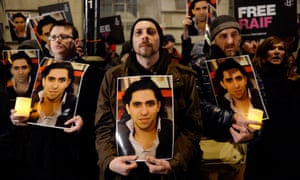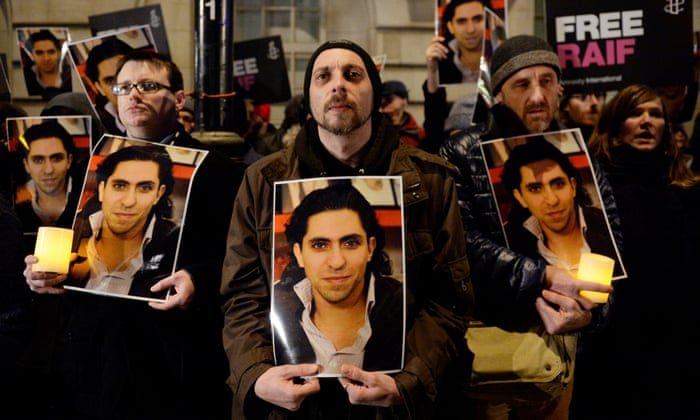
It was the fifth anniversary yesterday of the arrest of the Saudi blogger Raif Badawi, whose supposed crime was to argue for secularism, democracy and human rights. He was sentenced to 10 years in prison and 1,000 lashes – a punishment that amounts to death by torture – although only 50 lashes were inflicted on him in the one session. Medical opinion was that he would not survive the remainder of that part of his sentence.
His cause has been taken up by humanist organisations, as well as by Amnesty International. He has been honoured with the EU’s Sakharov prize. Even Prince Charles raised his case on a visit to Saudi Arabia. We may be sure that neither Theresa May nor Donald Trump would do so. It is one thing to coat huge arms deals in the rhetoric of defending western freedoms, but quite another to risk any of the profits for the sake of a Saudi man who wished to enjoy those same freedoms.
The Badawi case is illuminating about the nature of the Saudi regime and the ideas that it understands as an existential threat. These include Badawi’s brisk dismissal of the role of Islam in public life: “No religion at all has any connection to mankind’s civic progress … the codes governing the administration of the state can hardly be derived from religion.” Such ideas are obviously incompatible with the practice of theocracy. And perhaps they are so strange to the Saudi authorities that they can’t be taken seriously – after all, those convicted of “sorcery” in the kingdom are beheaded, whereas Badawi may survive his sentence, given enough attention and support from the outside world.
It is, of course, the Saudi regime that is chiefly responsible for his suffering, and that has the power to release him, but the case also suggests how hollow are western commitments to so-called western values. Badawi believes in democracy, rationalism and freedom of speech. These are all ideas we are supposed to promote and applaud, but in places where their exercise is costly we are mostly silent.
I suppose the Saudis might defend their repressive state by pointing to the horrors that have engulfed Iraq and Syria to their north and even Yemen to their south. But in all those cases, and especially in Yemen, the repressive Saudi state has itself been a destabilising factor for its neighbours.
There isn’t a clean or simple answer to the appalling horrors of the Middle East. If the Saudi theocracy falls, as it eventually must, what comes after won’t be a tranquil, secular democracy. Nonetheless, we owe it to Badawi to support and honour his courage with as little self-righteousness as we can possibly manage. At its root, the idea of human rights means that there are some things that it is wrong to do to any human being, and the punishment to which he was unjustly sentenced is one of them.


No comments:
Post a Comment